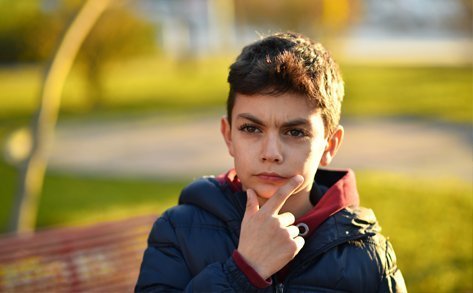 The good news is, whether or not you have anxiety, there are things you can do to help yourself manage stress and anxiety so that it doesn't get in the way. Look through our Books and Resources Resources page to find more resources. If you’d like to see if you might have too much anxiety, go through our Symptom Checker. It will give you some ideas about what you might do next. The Symptom Checker is a tool that was made for parents, so, just ignore whenever it says “your child”!
The good news is, whether or not you have anxiety, there are things you can do to help yourself manage stress and anxiety so that it doesn't get in the way. Look through our Books and Resources Resources page to find more resources. If you’d like to see if you might have too much anxiety, go through our Symptom Checker. It will give you some ideas about what you might do next. The Symptom Checker is a tool that was made for parents, so, just ignore whenever it says “your child”!Answer: Research tells us that anxiety likely results from a combination of things, like family history or genetics, brain and body chemistry, and your own behaviors, thoughts and experiences. So, we don’t really know what exactly causes it for each person, but several things can make anxiety stronger and make it last longer. Knowing facts about what keeps anxiety going can be a great first step in learning how to manage it. This website, and the books that are listed in the Books and Resources page, are good places to learn. You should also talk with a parent or a trusted adult and tell them about the worries or fears that you’ve been having and ask if they might be able to find a therapist or doctor in your area to help decide if you could benefit from treatment.
Answer: Therapy, such as something called cognitive-behavioral therapy (CBT), and some medications, have been found to be effective treatments for anxiety in youth. You might be surprised, CBT doesn't mean going to a therapist or counselor for the rest of your life! A therapist can help you learn ways to be able to feel less anxious and more in control of your stress and fears. The combination of CBT and medication can be more effective than either one alone.
Answer: CBT (and some medication) have been found to be effective for 60% of kids who suffer from anxiety disorders (50% to 70%). CBT and medicine combined has been found to help 80%. The time it takes will be different for different people but CBT is typically brief, like 10-16 meetings – that’s like a soccer or swimming season. You should talk with a parent or a trusted adult and tell them about the worries or fears that you’ve been having and ask if they might be able to find a therapist or doctor in your area to help decide if you could benefit from treatment.